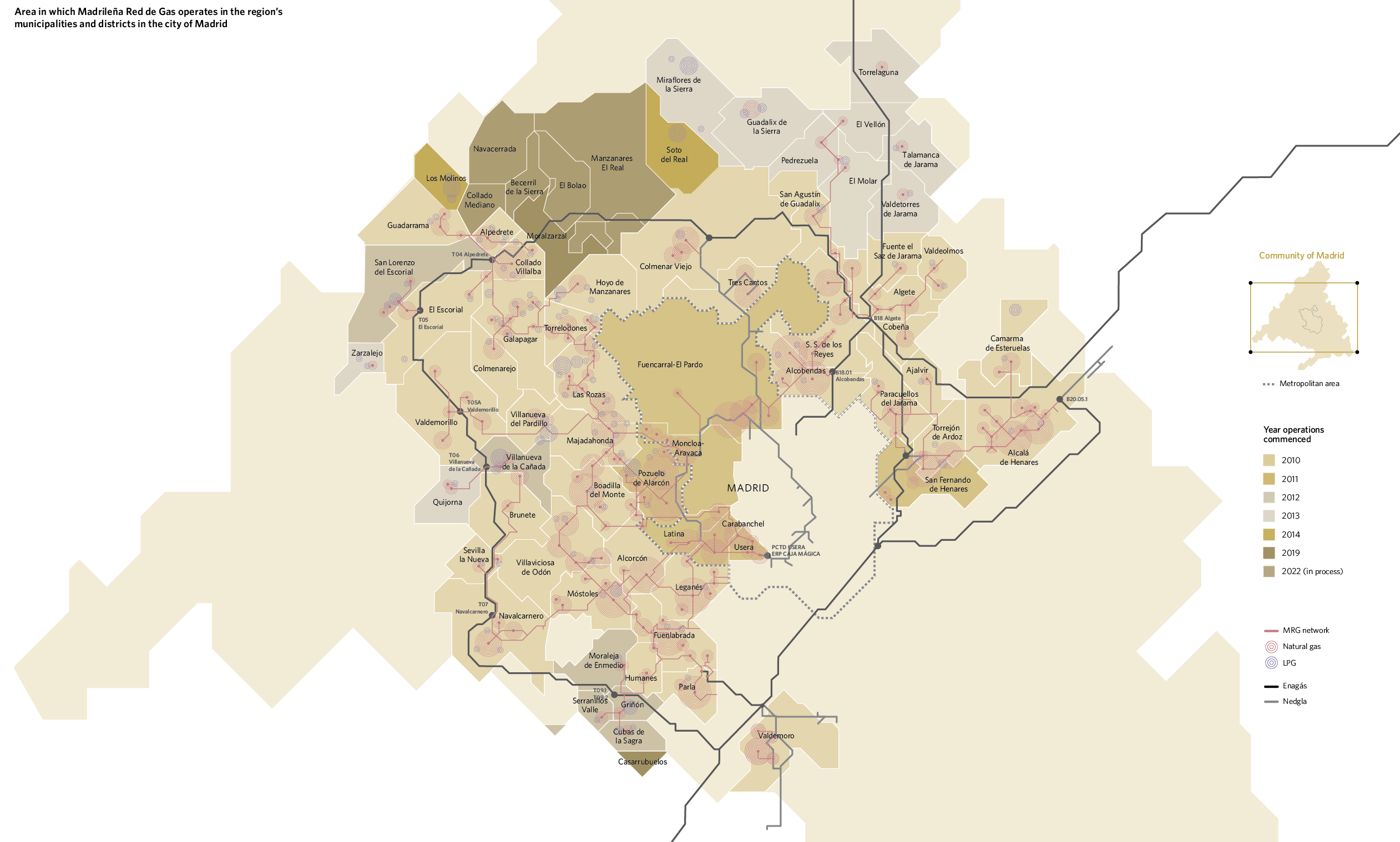2.1 Residential market
The effects of the pandemic continued to be felt in sales and in trends in the gas market in general, particularly in residential markets. Even so, in 2021 the number of contracts remained similar to that of previous years, therefore the financial year can be described as a period of market recovery.
At MRG a total of 15,437 new domestic installations entered into service. Added together with commercial premises, boiler rooms of communal residential buildings, institutional buildings and industries, a total of 15,930 new supply points were connected to our area of distribution. This stands as a success of the company’s expansion strategy, particularly if we consider the highly volatile circumstances, due mainly to rising energy prices and the emergence of new technologies.
Taking the two years prior to the pandemic as reference, in 2021 there was an even spread of new contracts throughout the year, reflecting the increased productivity in registration channels, which have largely succeeded in reducing the typical peaks and troughs associated with natural gas contracts.

Focusing on the various residential markets, MRG ended 2021 with an increase in contracts in new builds compared with previous years, although the last third of the year experienced a drop-off, as a result of the situation faced by the property market. Regarding spontaneous registrations, there was a significant increase compared with other years, mainly due to the rental market’s reactivation. For LPG, Madrileña Red de Gas maintained its strategy of recent years, making significant investments in networks that will become natural gas networks in a future transformation.
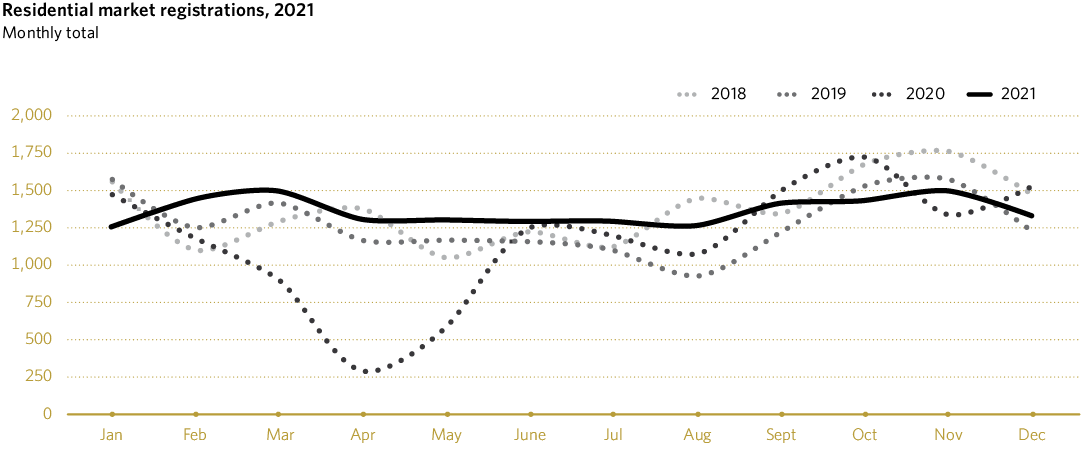

2.2 High consumption
The year ended with very positive figures in terms of the high-consumption market, which has increased by more than 189 GWh and 495 new supply points, showing that natural gas continues to be the safe and indispensable option for this market.
The year ended with very positive figures in terms of the high-consumption market, which has increased by more than 189 GWh and 495 new supply points
Natural gas forms a key part of the energy transition due to its economic and environmental advantages, as well as for the guarantee of supply. These reasons have led the Hospital Hestia and El Escorial funeral home to replace their diesel oil boilers with a natural gas version, achieving greater savings and improved performance.
To supply the Hospital Hestia, MRG invested €85,000 in the network. The pipeline process was a challenge due to its complexity, because the hospital is located close to the Santillana and El Atazar pipelines, which supply water to a large number of inhabitants in the Madrid region. This made the works more problematic, requiring the use of special protections and a load study to be conducted. In managing the various authorisations that were needed, several official bodies were involved: the Directorate-General for Highways, the Isabel II Pipeline and the rail infrastructure administrator ADIF.
MRG also collaborated with the new Oasiz Madrid shopping mall, the largest in Spain, which opened in early November in Torrejón de Ardoz. The collaboration was focused on designing the interior facility so that both the heating and all the catering premises had a natural gas supply.
Natural gas has also remained highly present in the industrial sector, where it is the main source of energy for production. In 2021, several food industries and a foundry chose to transform their facilities, demonstrating how important it is for them to have a reliable, safe and affordable energy supply.
Natural gas for vehicles (NGV), meanwhile, continued to strengthen its position as the fuel considered to be cleanest both by the public and by the professional transport sector.
Another notable fact from the past financial year is the opening of two public petrol stations in the towns of Fuenlabrada and Leganés, within the MRG distribution area.
Furthermore, as a result of the MOP16 network pipeline built by MRG, the Madrid Taxi Co-operative (SCAT) has a new compressed natural gas (CNG) loading infrastructure at its Secoya facility, which shows the support from the taxi sector for less polluting fuel sources and the policies to improve air quality adopted by Madrid city council.
In the last third of the year, Leganés town council began its renovation project to ensure energy improvements in 13 municipal buildings, including eight primary schools, a nursery, a cultural centre, a civic centre, an indoor swimming pool and a municipal warehouse, which involved transforming 19 boiler rooms and all climate control facilities from diesel to natural gas. The investment was €1,540,000 and was co-financed by FEDER European funds. MRG collaborated with the town council to plan the works and put the facilities into service. The most notable aspect of this project is the fact that the transformation was carried out during the heating season and without any classes being interrupted.
At MRG we are very aware of the importance of combating climate change, and particularly the importance of good air quality in Madrid, for which natural gas plays a decisive role. Accordingly, at MRG we work to provide assistance and solutions that can help bring about the change from polluting energy sources to natural gas. An example of this is the recent collaboration on the study to transform various barracks in the Madrid region to help reduce the emission of polluting gases, while also improving energy efficiency and reducing energy costs through the use of more modern technologies.
As in previous years, MRG helped to improve air quality in the Region of Madrid by taking part in the plan to replace boilers in private residences, with an initial contribution of €110,000 and a second of €200,000, as part of the campaign designed to transform boiler rooms. A total of 38 boiler rooms were transformed, all in communal residential buildings, of which 24, in the city of Madrid, formerly ran on coal, which has prevented emissions amounting to 2,700 metric tons of CO2 a year *..
Finally, in 2021 we maintained our support for the sectors most affected by the COVID-19 crisis, such as small businesses and SMEs, through special campaigns devised specifically for them.
* Calculation based on emission data published on the website www.miteco.gob.es
2.3 New construction
In the new-build market, in 2021 expectations were exceeded in terms of homes delivered. Although the construction sector did not come to a complete halt during the crisis, in 2021 activity was able to regain its pace, helped in part by the projects launched prior to the current Technical Building Code.
Over the course of 2021 a natural gas supply was provided to 6,913 homes, exceeding the initial forecast by 20%. Of these, 4,647 are fitted with individual boilers and 2,266 feature central boiler rooms.

Over the course of 2021 a natural gas supply was provided to 6,913 homes, exceeding the initial forecast by 20%
The Madrid region is the autonomous community with the highest rate of growth on the property market. The towns of Boadilla del Monte and Alcalá de Henares, both within MRG’s operating area, are where most new-build homes are being delivered. They are followed by Torrejón de Ardoz, Colmenar Viejo and Valdemoro, towns where MRG is also authorised to distribute natural gas. This growth is partly due to recently completed housing developments.
More than 15 thousand homes are expected to be built in the Madrid region over the coming years.
There are also other developments in the project stage in San Sebastián de los Reyes and Alcorcón, two towns where MRG is working to provide thermal solutions through gas natural in district heating and cooling networks. The aim of these projects is to ensure comprehensive development of the necessary services, including the supply of domestic hot water, heating and cooling, and even lighting with natural gas. In all of these introducing renewable gases such as biomethane, along with hydrogen, would be fully viable.
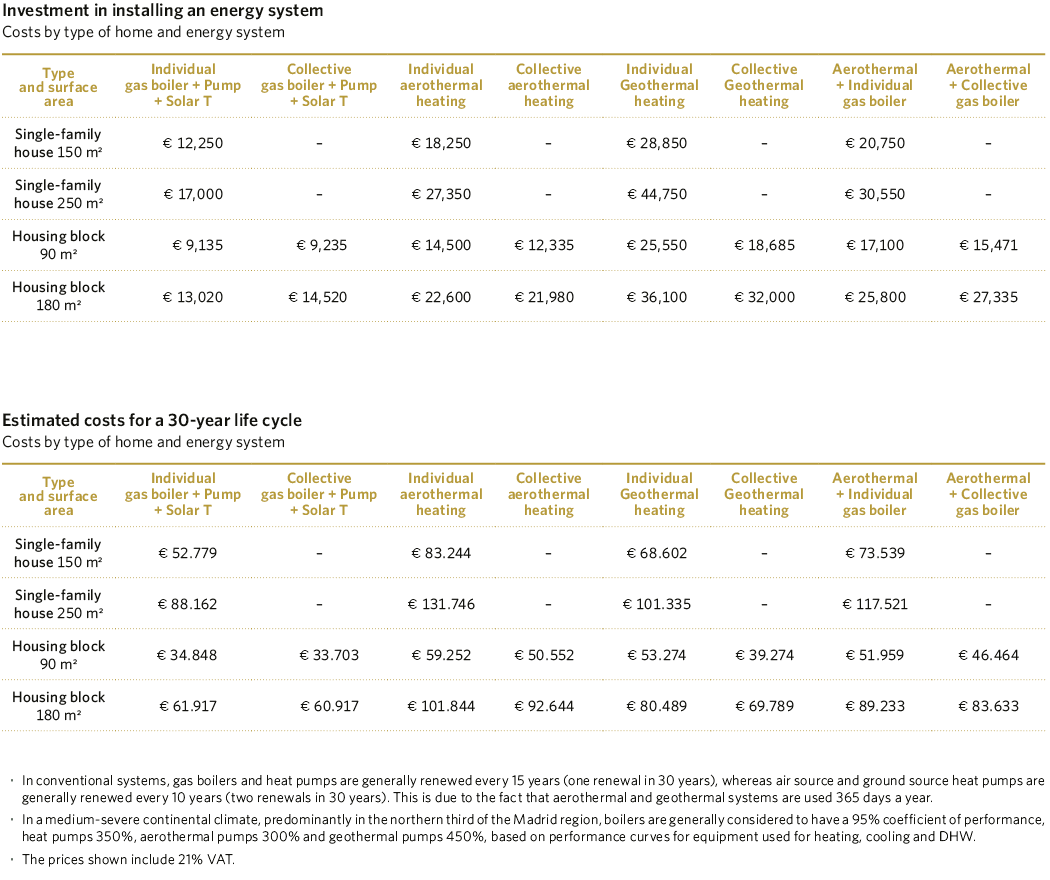
On the other hand, over the past few years other solutions have been introduced to meet the energy needs of new builds, such as aerothermal and geothermal climate control, which are presented as a new, more profitable solution. However, the figures indicate the opposite. This trend seems to have come from a mistaken interpretation of the Technical Building Code with regard to the feasibility of using natural gas. Using natural gas in new builds is feasible from both a technical and regulatory standpoint, and remains a highly efficient and profitable source of energy.
NORBA, the tool developed by the Thermal Engineering Group of the Universidad de Sevilla, allows natural gas facilities to be compared with aerothermal electric and/or biomass climate control in new builds
In order to correct this misconception, and with the aim of assuaging incorrect interpretations, SEDIGAS (the Spanish Gas Association) has supported the creation of NORBA, developed by the Thermal Engineering Group from the Engineering School at the Universidad de Sevilla. This tool allows natural gas facilities to be compared with aerothermal electric and/or biomass climate control in new builds. MRG has produced a video explaining how NORBA works in order to help disseminate the tool and facilitate access by property developers, architects’ studios, engineering firms, etc.
According to the NORBA comparison, in most cases natural gas is awarded an ‘A’, the system’s highest energy rating. Natural gas also complies with the 2019 Technical Building Code and its building and running costs are more favourable.
In comparison with aerothermal electric energy, natural gas is efficient, affordable and provides immediate domestic hot water and heating. On the other hand, with aerothermal electric solutions, climate plays a key role in the performance of these devices, in areas with a continental climate, such as the Madrid region, they do not reach particularly high levels of efficiency. Additionally, it is increasingly common for new-build homes to have a heating service in winter and climate control in summer, which is why an aerothermal pump is often chosen as a single solution to both scenarios. However, the most ideal way to meet this demand is with hybrid natural gas and aerothermal systems, an economically unbeatable option, as proven by the studies and analyses carried out.
Finally, Madrileña Red de Gas continues to work actively in its discussions with developers, builders and thought leaders, informing them and engaging with them with regards to any new developments at a technical, administrative or legal level.
2.4 LPG market
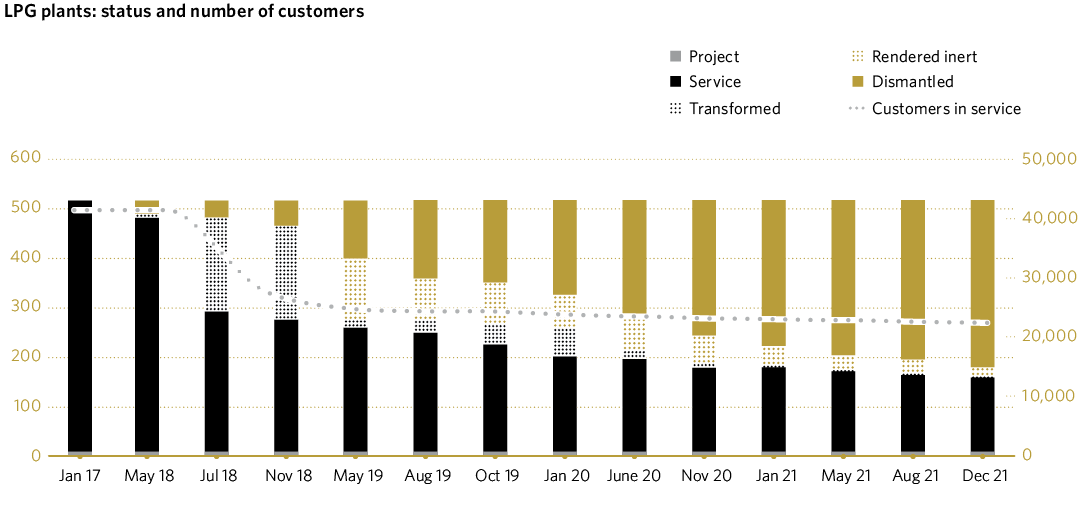
MRG has set a goal of transforming more than 15 thousand supply points over the next two years
In recent years Madrileña Red de Gas has carried out a policy to transform its LPG installations based on the objective maintenance costs of each one. The company has therefore proceeded to transform installations from LPG to natural gas in facilities where there was a strategic requirement for an almost total renovation or where running costs were particularly high.
Given the current LPG market situation, MRG has set a goal of transforming more than 15 thousand supply points over the next two years. To that end, in 2021 there was a lot of planning, surveying, budgeting and dimensioning for all the work involved in that target.
Transforming from LPG to natural gas is a highly delicate activity, in which different courses of action and timescales need to be carefully weighed up. This process is also highly intrusive for users, as it involves modifying and adapting the facilities and apparatus in their homes. This is why it’s essential to know very clearly what the objectives are and what tasks need to be carried out.
Madrileña Red de Gas has more than 300 km of propane gas pipelines, of which 74 will be completely renovated. The rest will be reused or decommissioned and rendered inert, as the natural gas network is duplicated in these areas.
MRG has entrusted the design and awarded a new transformation contract to eight leading companies in the sector, with a budget of more than €10 million for the works to reuse networks, adapt installations, transform equipment and dismantle storage centres. Internally, this required strengthening the company’s management team and developing a range of IT-based initiatives.
2.5 Collaborators
MRG’s strategic collaboration in 2021 with the property portal Idealista has had a digital impact among more than 1,400 advertisers of properties in the company’s distribution area
MRG’s strategic collaboration in 2021 with the property portal Idealista has had a digital impact among more than 1,400 advertisers of properties in the company’s distribution area. This collaboration helped to boost the vertical saturation market; in fact, new supply contracts were recorded in the summer season, which is historically unusual. Once summer came to an end, there was a steady rise in the number of requests received by our virtual office.
In 2021 conversations also got under way with the National Association of Refurbishment Companies (ANERR), with the aim of establishing a collaboration with MRG in all of the association’s projects in the Madrid region. The collaboration agreement has yet to be signed.
In 2020, with a view to reactivating sales of new gas installations, in collaboration with Unísono (now Intelcia Spain) MRG initiated a pilot telemarketing project, which was consolidated in 2021. In this way, we have been able to engage in a more direct way with our potential customers, with highly satisfactory results. This project was in place throughout 2021, and led to new supply points being secured and a greater awareness of our potential customers.
The ongoing improvement in the customer’s supply, optimising the sales pitch used in calls, and the fact of having approached different companies that are competitors among themselves led to a significant improvement in results, resulting in a new collaboration agreement being signed for 2022.

With regard to sales in digital environments through the Selectra call centre, MRG conducted a campaign to recover lost leads, which proved to be a resounding success. All manner of requests were processed, with offers matched to each customer’s profile by telephone, which was then managed by the installation company allocated to the different areas where our customers live. By doing so, MRG brought greater transparency to sales operations and is developing a relationship of genuine trust with its customers. We also continued to deal with new supply requests.
Additionally, in collaboration with The Marketing Hub, an advertorial was produced, in both digital and printed format, published by the magazine of the School of Property Administrators of Madrid (CAFMadrid). As a result of this initiative, MRG was present in the repertory of services for owners’ associations (Solucionaf), the CAFMadrid platform, which is used as a directory for services in the sphere of owners’ associations and property administrators, and may also be consulted by general public.
The 2021 financial year also led to the full integration of Enerty into our systems and mobility tools, adapting it so that it draws up other documents, such as anomaly correction slips from regular inspections carried out every year.
This ambitious project is the result of the collaboration between AGREMIA (the Association of Installation Companies of Madrid) and Logalty, a company with expertise in digital transactions and certificates, which allowed for two thousand digital certificates to be processed through the platform. Consolidation with Enerty ensures correct regulatory compliance, complete transparency and legal certainty for the process of certifying installations.
Finally, in collaboration with the engineering firm REINS, the inhabited home potential viewer was developed, which has led to continuity in how the area managed by MRG is viewed, dividing it up by markets and supplies.
The viewer is based on Google Maps technology, and by using land registry and MRG network cartography overlays we can develop a geolocated overview of the network for all properties created in our customer management system (SAP). The company is therefore able to monitor the entire territory at all times and know where the market segments are that can be targeted, in order to generate new supply points and saturate the networks.
2.6 Distribution network
The 2021 financial year began with Storm Filomena, bringing an unusually heavy snowfall to the Madrid region, with subsequent periods of freezing temperatures, combining with the uncertainty of the pandemic, which still affects us all.
Accordingly, MRG strengthened its emergency response service and its entire field work team, made up of more than 40 people. The technical team was joined by the operations team to work continuously in resolving each and every incident that occurred as a result of the storm.
The MRG natural gas distribution network, which supplies more than 915,000 customers, was not affected by Storm Filomena
From 8 January, more than 1,500 emergency calls were received by the service, a figure much higher than the average demand (in a normal January around 800 warnings are received).
Despite Filomena, the MRG natural gas distribution network, which supplies more than 915,000 customers in the Region of Madrid, did not record a single incident and functioned as normal.
During that time, a full and continuous process of coordination with the relevant authorities working in energy, safety and roadway maintenance was maintained. Special mention must be made of the 112 and fire services.
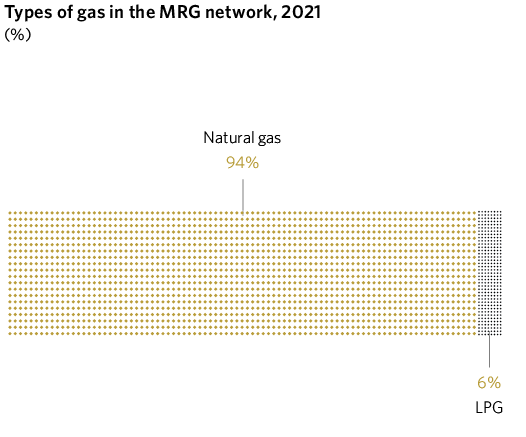
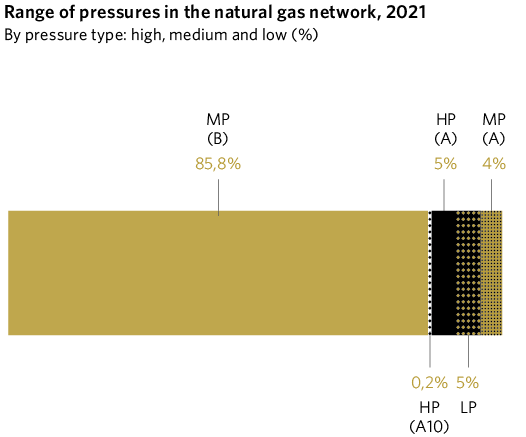
With regard to the supply of LPG and LNG, our customers were barely affected at all, although, due to roads being impassable because of the snow, which prevented tanker trucks from travelling, there was the occasional delay in the supply to several LPG satellite plants and to one LNG plant. The delays were resolved in as short a time as possible thanks to the coordination of the different courses of action taken with the authorities concerned.
For another year running, MRG met its commitment to maintaining its distribution system in full, including the 169 LPG plants and the five satellite LNG plants.
Additionally, to ensure that all systems in our regulation and metering stations were operating as they should at their various pressures, with regulatory monitoring of the gas network, more than 15 thousand scheduled preventive and corrective maintenance actions were carried out. The biannual leak test was also conducted along 3,295 km of the network. To verify their operational status, 8,777 valves in natural gas and LPG networks were checked and more than 1,178 tasks were completed that involved painting, cleaning and/or clearing out auxiliary installations, LPG plants and LNG plants. More than 3,600 actions were carried out on equipment that ensures the cathodic protection of our steel networks.
As part of the MRG action plans for 2021, the necessary overhauls, mesh work and corrective measures were also carried out to maintain the safety conditions of the network and guarantee supply in the natural gas and LPG networks, replacing materials such as steel, cast iron and copper for polyethylene pipeline. In total, in 2021 around 1,800 metres of network were replaced.
Additionally, and in coordination with the local authorities in the various municipalities involved, MRG dismantled 37 LPG plants, which involved emptying out, burning and rendering inert 52 tanks. More than 50 journeys needed to be made to transfer the surpluss gas to other MRG plants while preventing any emissions into the atmosphere. The waste obtained during the dismantling process was transported to processing plants run by the Madrid region authorities, while complying with the MRG environmental commitment, and all without disturbing the usual activities of our customers and their neighbours, with all precautions taken and with COVID-19 disinfection protocols performed during and after each job, so that the area was always completely disinfected once the work had been completed.
By complying with the action protocols established by the Ministry of Health and our Health and Safety department, no cases of COVID-19 infection between workers were recorded.
In collaboration with several other companies, public bodies and customers, all requests to reposition gas pipelines due to their location affecting planning developments, roads, new buildings, and so on, were dealt with and completed, which involved repositioning 1,100 metres of gas pipeline.
Finally, with regard to fixing leaks, Madrileña Red de Gas was able to reduce the resolution period by 6%, and in doing so make both environmental and safety-related improvements.
Emergencies
Continuing with the objective of upholding the maximum safety parameters for our networks and the customers connected to them, once again in 2021 we succeeded in addressing all alerts of maximum priority in less than 30 minutes.
In order to continue providing an improved service for our customers, a new centre was created as an operational base for activities to deal with emergencies and maintenance of our distribution system, to be used by our staff for services in the field. The various additional processes were improved, with computerised mobility systems that help to reduce the amount of paper used and optimise how information resulting from field work carried out by our teams is managed.
Control centre
One of our key objectives in 2021 was to prepare the MRG networks to admit any gas type from a renewable source, such as hydrogen and biomethane. To that end, our network simulation system is being adapted to incorporate these gases into our daily management processes. We are also conducting analyses of the capacity needed to incorporate the different projects relating to renewable gases.
One of our key objectives in 2021 was to prepare the MRG networks to admit any gas type from a renewable source, such as hydrogen and biomethane
Finally, throughout 2021 we continued to optimise information from other remote installations, replacing old communication systems for other more modern and more advanced systems, by which our data analysis and decision making can be increased and improved in terms of how our distribution network is managed.

